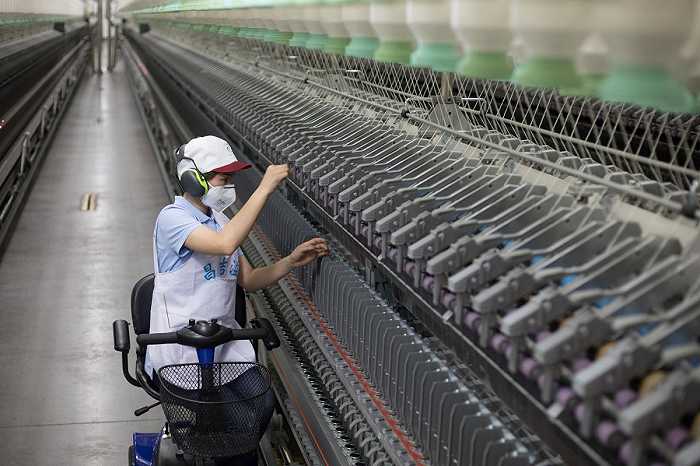Previously an anonymous garment production conglomerate relying mainly on cotton production, Esquel is now pursuing greater brand recognition in search of global fame.

Photo from CFP
By HUANG Shan
The spiral-shaped logo of Esquel has started to appear on the tags of celebrated clothing brands in China. Before the pandemic, Esqual made billions supplying top-quality cotton to global brands. The Hong Kong conglomerate’s business touches just about every step of a garment making from cotton farms to clothing factories.
The company had remained a largely nameless cog in the vast global supply machine until worrying setbacks prompted a rethink in brand strategy and Esquel stepped from the shadows, seeking spandex-level ubiquity and fame. But coming up with premium fabrics, valued by brands and customers everywhere, is more than a mere marketing strategy.

Esquel is one of the largest textile manufacturers in the world, generating over US$1.3 billion (8.41 billion yuan) annually. Most sales come from Europe and North America, 58 percent from the United States alone.
The reliance on Western orders left Esquel vulnerable during the pandemic. But the company’s troubles didn’t stop there. Last July, a subsidiary was listed on the U.S. sanction list for alleged labor abuse in Xinjiang. Orders were canceled and Esquel shut down the factories in Mauritius and Malaysia which directly supplied the clients.
Just at the right time, the Chinese market bounced back and sales from Asia rose from 23 percent to 31 percent last year. It’s a logical step for Esquel to join with brands. Contracts with two large sportswear showcase new forms of partnerships with a variety of potential clients, including independent designers and boutique brands. But while designers and independent brands have been enthusiastic, none of them have actually signed deals. The main obstacle is their volumes, too small for Esquel’s current business model.
Esquel’s advantages mainly lie in cotton growing and spinning. New fabrics are expected to come through collaboration with independent designers, a standard industry practice. Today’s boutique brands maybes powerful global fashion house tomorrow. Esquel hopes to be with them from day one, enabling their growth.
What Esquel has in mind is to replicate the success of Lycra (a brand name for spandex). The DuPont stretch fabric is found in almost every pair of yoga pants. By owning the fabric technology and having its brand name printed on clothing labels, a manufacturer like Esquel can achieve better consumer recognition and thus a better profit margin.
Though Esquel has yet to invent a fabric as revolutionary as spandex, it has become more vocal. Esquel logos are now on many labels. Sportswear sold by Li-Ning now comes with a tag which waxes lyrical about the superior quality of Extra Long-Staple Cotton.
Marketing can do part of the job, but a robust supply chain is critical. Equally importantly, consumers have to be willing to pay more for a “story,” be it about sustainability or innovation.
Another front that Esquel has been exploring is its own clothing brand. The company already operates in almost all upstream processes. This would eventually allow Esquel to lower costs, which translates to competitive prices.
Lofty values might not open many wallets. The only real question for most brands is whether the sight of an Esquel label induces the customer to spend more or not. Esquel will not convince brands to use its logo until customers are ready to pay a premium for it.
It is still unclear whether or when these efforts will pay off, given the somber realities of the clothing market. Leading brands are already at knives out in every corner of the bazaar. The road to prestige will be a long and hard one.